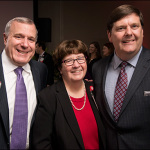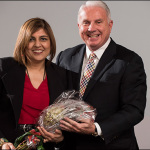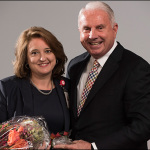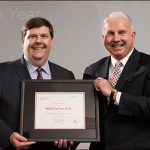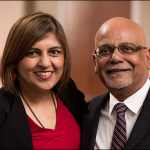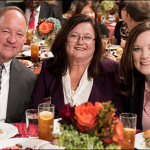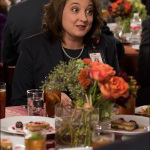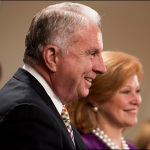October 27, 2015

Five outstanding Texas Children’s employees who exemplify leadership while upholding Texas Children’s mission and core values were honored October 23 at a luncheon naming the 2016 Catalyst Leadership Award recipients and the Catalyst Leader of the Year.
Six years ago, members of Texas Children’s Board of Trustees made personal donations to an endowed fund that led to the establishment of the Mark A. Wallace Catalyst Leadership Award in honor of Mark A. Wallace’s 20th anniversary as president and CEO. Nominations for the award are thoughtfully reviewed by the selection committee, which includes representatives from the organization’s senior executive team, Human Resources, Texas Children’s Board of Trustees, and Chief Executive Officer Mark A. Wallace.
“It was an impressive group of individuals nominated this year making the decision process extremely difficult,” Wallace said. “Please join me in congratulating these deserving individuals for their proven ability to lead by example both in their professional and personal lives.”
The 2016 Catalyst Leaders are:
Jamie Choi, Manager, Pharmacy
Preanka Desai, Administrative Supervisor, Radiology
Shannon Holland, Assistant Clinical Director, Nursing
Melissa Murrah, Director, Risk Management
The 2016 Catalyst Leader of the Year is Texas Children’s Pediatrics Humble/Atascocita Pediatrician Dr. Mark Farrior.
Farrior delivers the ultimate patient experience, both with his excellence in clinical practice, as well as his dedication to assist our physicians and staff to better care for all of our patients. “Leading tirelessly” is only the beginning of Farrior’s leadership style. He is one of the driving forces behind the usage of electronic medical records at Texas Children’s Pediatrics. He demonstrates excellent clinical judgment and serves as chairman for the TCP Practice Management Advisory Council, ensuring we provide the highest level of care for our patients and families.
“Dr. Farrior is an amazing person and physician,” said Dr. Stanley Spinner, chief medical officer and vice president of Texas Children’s Pediatrics. “Whenever we want to make something happen, Farrior is our go-to person. He’s always willing to go the extra mile.”
Farrior said being part of Texas Children’s is what keeps him going every day because the mission and guiding principles of the organization encourage him to focus on the quality of care he gives his patients. As for leadership, he said his best advice is to get involved and be engaged.
“Get on a committee, get to know the doctor’s in your group and help each other move forward,” he said. “We all are in this together.”
Throughout the coming year, Farrior and the other Catalyst recipients will receive a number of honors and participate in a variety of rewarding learning experiences. Additionally, as the Catalyst Leader of the Year, Farrior will further develop his talents by completing advanced training at a renowned organization.
To learn more about this year’s Catalyst leaders click here.
Five outstanding Texas Children’s employees were honored October 23 at a luncheon naming the 2016 Catalyst Leadership Award recipients and the Catalyst Leader of the Year.





